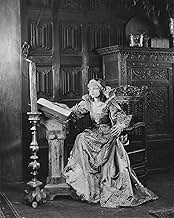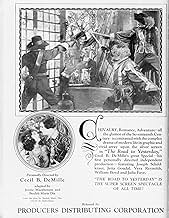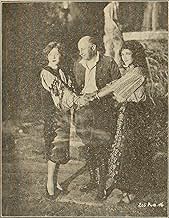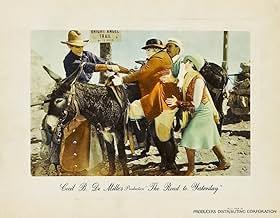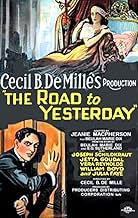AVALIAÇÃO DA IMDb
6,3/10
192
SUA AVALIAÇÃO
Adicionar um enredo no seu idiomaA married couple discovers that their strained relationship is the result of unhappiness in their past lives.A married couple discovers that their strained relationship is the result of unhappiness in their past lives.A married couple discovers that their strained relationship is the result of unhappiness in their past lives.
- Direção
- Roteiristas
- Artistas
Wilson Benge
- Kenneth's Butler
- (não creditado)
Robert Brower
- Elderly Party Guest
- (não creditado)
Charles Clary
- Doctor
- (não creditado)
Iron Eyes Cody
- Indian
- (não creditado)
Frank Coghlan Jr.
- Boy Scout
- (não creditado)
Walter Long
- Rowdy in Burning-at-the-Stake Scene
- (não creditado)
Chester Morris
- Party Guest
- (não creditado)
Sally Rand
- Party Guest
- (não creditado)
Avaliações em destaque
"The Road to Yesterday" is a misfire from the director of huge mega-epics, Cecil B. DeMille. While today he's known wifely for his religious epics, in the 1920s he mostly made romances and dramas...but I can't recall him ever making a film with a plot like this one! It's all about reincarnation and feelings of déjà vu...and people unwisely allowing their lives to be governed by these feelings.
The story begins with a man and woman going on their honeymoon to the Grand Canyon. Inexplicably, the new wife starts acting strangely. When asked, it's because she is filled with feelings of dread and talks about some mumbo jumbo about them in past lives. She tosses him out of the bridal suite and he's stuck fending for himself.
While wandering about the Canyon, he meets a nice fellow, the Reverend Jack Moreland (William Boyd) who tells the hubby to put his faith in God. The hubby says he'll try being a Christian...but later gives it all up when his injured arm gets worse.
Shortly after, Moreland meets a flapper-type girl, Bess, and he becomes infatuated, though she had just flippantly agreed to marry some guy she just met.
Oddly, in the next scene, the newly weds return home to a party....and apparently they somehow patched things up. Moreland shows up to the party and begins spouting about having loved Bess in their past lives...a VERY odd thing for a Christian minister to say. Now, he be been Buddhist or Hindu...it would have made a lot more sense. The party guests make fun of the Reverend and Bess joins them in mocking 'ol Moreland. And, the hubby is made at God and gives up on his new faith. There's a lot more...and things get really strange when all the leads in the film just coincidentally end up on the same train bound for San Francisco! When it crashes, it somehow sends everyone back several centuries...and the characters do all sorts of wacky things.
If this all sounds like a weird confection of various religions and plots, you're right. As such, it's bound to be the type thing that would not appeal to various believers because it's such a hodgepodge. Likewise, most atheists and agnostics would find all the religious elements tedious and confusing.
Apart from some decent acting and some really exceptional cinematography, there isn't a lot to love about this film. Its plot is confusing, the intertitle cards are VERY heavy-handed and preachy and the overall picture is just strange...but not in a good way. And, I'm not sure if there really is even a point to all this story.
BY the way, get a load of the trainwreck sequence as the Reverend tries to protect Bess...and his hands end up on her boobs. That likely would have been edited out had the film come out during the Production Code era! This alone makes it worth seeing!
The story begins with a man and woman going on their honeymoon to the Grand Canyon. Inexplicably, the new wife starts acting strangely. When asked, it's because she is filled with feelings of dread and talks about some mumbo jumbo about them in past lives. She tosses him out of the bridal suite and he's stuck fending for himself.
While wandering about the Canyon, he meets a nice fellow, the Reverend Jack Moreland (William Boyd) who tells the hubby to put his faith in God. The hubby says he'll try being a Christian...but later gives it all up when his injured arm gets worse.
Shortly after, Moreland meets a flapper-type girl, Bess, and he becomes infatuated, though she had just flippantly agreed to marry some guy she just met.
Oddly, in the next scene, the newly weds return home to a party....and apparently they somehow patched things up. Moreland shows up to the party and begins spouting about having loved Bess in their past lives...a VERY odd thing for a Christian minister to say. Now, he be been Buddhist or Hindu...it would have made a lot more sense. The party guests make fun of the Reverend and Bess joins them in mocking 'ol Moreland. And, the hubby is made at God and gives up on his new faith. There's a lot more...and things get really strange when all the leads in the film just coincidentally end up on the same train bound for San Francisco! When it crashes, it somehow sends everyone back several centuries...and the characters do all sorts of wacky things.
If this all sounds like a weird confection of various religions and plots, you're right. As such, it's bound to be the type thing that would not appeal to various believers because it's such a hodgepodge. Likewise, most atheists and agnostics would find all the religious elements tedious and confusing.
Apart from some decent acting and some really exceptional cinematography, there isn't a lot to love about this film. Its plot is confusing, the intertitle cards are VERY heavy-handed and preachy and the overall picture is just strange...but not in a good way. And, I'm not sure if there really is even a point to all this story.
BY the way, get a load of the trainwreck sequence as the Reverend tries to protect Bess...and his hands end up on her boobs. That likely would have been edited out had the film come out during the Production Code era! This alone makes it worth seeing!
Inexplicably setting this romantic drama at the Grand Canyon, Cecil B. DeMille was probably trying to signal the grandiosity of his reincarnation theme. However, his real intention is to deliver the box-office goods: in this case, a trainwreck, a nice swordfight, a lashing, a witchburning, not one but TWO virginity-threatening wedding nights, plus his usual comforting religious affirmation.
The plot follows two couples: glum newlyweds Joseph Schildkraut and Jetta Goudal are conflicted in their unconsummated marriage, while flapper Vera Reynolds deserts her boring fiancee for virile minister William Boyd. Soon--though inexplicably--they all find themselves on the same train to San Francisco; a crash then [inexplicably] rockets them all back to the Elizabethan era. While the four stars reconfigure their relationships, everyone spouts much Renaissance Faire dialogue ["Thou art the wastefulest tapster that ever vexed a gentle tavern-woman!"]
While DeMille tolerates some of the miming and pointing that gives silent film acting a bad name, the leads are all appealing, especially William Boyd, whose playful zest suggests early Errol Flynn. Despite playing both an innocent bride and a swarthy gypsy, the exotic Jetta Goudal gets little character to develop as both roles are one-dimensional [her performance in WHITE GOLD is considerably more complex]. The twentieth-century Joseph Schildkraut makes a credible protagonist, but the seventeenth-century Schildkraut acquires a dark bob and a pearl earring, uncannily anticipating Jack Lemmon's "Daphne" in SOME LIKE IT HOT.
In the end, what's most impressive is how smoothly DeMille manages to pack great chunks of romance, drama, action, and spectacle into this fast-moving vehicle, but anyone looking for a thoughtful treatment of reincarnation had best look elsewhere.
The plot follows two couples: glum newlyweds Joseph Schildkraut and Jetta Goudal are conflicted in their unconsummated marriage, while flapper Vera Reynolds deserts her boring fiancee for virile minister William Boyd. Soon--though inexplicably--they all find themselves on the same train to San Francisco; a crash then [inexplicably] rockets them all back to the Elizabethan era. While the four stars reconfigure their relationships, everyone spouts much Renaissance Faire dialogue ["Thou art the wastefulest tapster that ever vexed a gentle tavern-woman!"]
While DeMille tolerates some of the miming and pointing that gives silent film acting a bad name, the leads are all appealing, especially William Boyd, whose playful zest suggests early Errol Flynn. Despite playing both an innocent bride and a swarthy gypsy, the exotic Jetta Goudal gets little character to develop as both roles are one-dimensional [her performance in WHITE GOLD is considerably more complex]. The twentieth-century Joseph Schildkraut makes a credible protagonist, but the seventeenth-century Schildkraut acquires a dark bob and a pearl earring, uncannily anticipating Jack Lemmon's "Daphne" in SOME LIKE IT HOT.
In the end, what's most impressive is how smoothly DeMille manages to pack great chunks of romance, drama, action, and spectacle into this fast-moving vehicle, but anyone looking for a thoughtful treatment of reincarnation had best look elsewhere.
If Cecil B. DeMille was the high priest of hokum, his long-term screenwriter and mistress Jeanie MacPherson was its goddess. The Road to Yesterday is among the most gloriously nonsensical stories in the MacPherson canon, being a sweeping tale of scandalous love, divine intervention and not-so-divine reincarnation.
Despite the incompatibility of Christianity and "occult" beliefs, MacPherson had flirted with the subject of past lives before in Joan of Arc, Male and Female and a few others. This is her only screenplay to entirely revolve around the concept, and begins by reminding us that (apparently) we all have inexplicable dislikes or loves for other people, and that this is (obviously) all down to reincarnation. As the story wears on the daft ideas pile up, with one character inheriting an arm-ache from his past self, another just happening to own and casually use a medieval hunting knife, rather than donating it to a museum before it falls apart. The setting for the inevitable past-life flashback is (of course) Ye Olde Englande, complete with outlaws, wenches, witches burned at the stake etc. etc.
And yet director DeMille innocently films all this with amazing grace and visual flair. Of particular note here is the "Rembrandt" lighting and other tricks with shadows and stark framing. DeMille's goal with these techniques is not merely to show off; in spite of his reputation being all about scale and spectacle, DeMille always used cinematic technique to highlight characters, framing actors within dark backgrounds at moments of dramatic tension or picking out an individual in a crowd. Even in his mightiest epics DeMille never once lost sight of the human relations at the heart of the story, and this is always reflected in his visual style.
Also very much worthy of a mention here is DeMille's editor Anne Bauchens, who was the most prolific collaborator of his entire career. Unlike MacPherson and recurring character actress Julia Faye she was not one of the director's mistresses. She kept her standing in the DeMille stock company simply by being very good at what she did. Her work in the train wreck sequence, intercutting shots of the speeding locomotives with the fistfight between Boyd and Schildkraut, make it the most thrilling moment of the whole picture.
It is in these more outlandish collaborations that you can see how MacPherson and DeMille perfectly complement each other. Who else but DeMille was so good at making the ridiculous seem poetic? Yes, this story is absolute 24-carat hogwash, but DeMille handles it with such rhythm, such finesse and such grandeur, the chances are you won't care.
Despite the incompatibility of Christianity and "occult" beliefs, MacPherson had flirted with the subject of past lives before in Joan of Arc, Male and Female and a few others. This is her only screenplay to entirely revolve around the concept, and begins by reminding us that (apparently) we all have inexplicable dislikes or loves for other people, and that this is (obviously) all down to reincarnation. As the story wears on the daft ideas pile up, with one character inheriting an arm-ache from his past self, another just happening to own and casually use a medieval hunting knife, rather than donating it to a museum before it falls apart. The setting for the inevitable past-life flashback is (of course) Ye Olde Englande, complete with outlaws, wenches, witches burned at the stake etc. etc.
And yet director DeMille innocently films all this with amazing grace and visual flair. Of particular note here is the "Rembrandt" lighting and other tricks with shadows and stark framing. DeMille's goal with these techniques is not merely to show off; in spite of his reputation being all about scale and spectacle, DeMille always used cinematic technique to highlight characters, framing actors within dark backgrounds at moments of dramatic tension or picking out an individual in a crowd. Even in his mightiest epics DeMille never once lost sight of the human relations at the heart of the story, and this is always reflected in his visual style.
Also very much worthy of a mention here is DeMille's editor Anne Bauchens, who was the most prolific collaborator of his entire career. Unlike MacPherson and recurring character actress Julia Faye she was not one of the director's mistresses. She kept her standing in the DeMille stock company simply by being very good at what she did. Her work in the train wreck sequence, intercutting shots of the speeding locomotives with the fistfight between Boyd and Schildkraut, make it the most thrilling moment of the whole picture.
It is in these more outlandish collaborations that you can see how MacPherson and DeMille perfectly complement each other. Who else but DeMille was so good at making the ridiculous seem poetic? Yes, this story is absolute 24-carat hogwash, but DeMille handles it with such rhythm, such finesse and such grandeur, the chances are you won't care.
A couple of players new to Cecil B. DeMille had the leads in The Road To Yesterday. Joseph Schildkraut would appear in other DeMille features, but Jetta Goudal would be in this one and only DeMille production.
It was a DeMille production in every sense of the word. DeMille had left Paramount to found his own studio which would not survive into the sound era. The team he had assembled at Paramount however went with him, you'll see many familiar names in the credits behind the camera.
Schildkraut and Goudal play a married couple, but they're having problems in the bedroom, she's rather frigid with him. He has to rape her in order to get a little of what the marriage vows promise. It all stems back from centuries ago when all the principal cast members who were reincarnated knew each other back in Elizabethan England.
In a flashback in Goudal's mind after she's injured in a train wreck she sees what went on. She was a fiery gypsy temptress then and Schildkraut was a knight in good standing with the Tudor Monarchy. I'll not reveal it except to say it was romantic hokum of the kind that DeMille grew up with in his Victorian childhood.
The train wreck was a marvelously staged piece of spectacle recalling to mind his other train wrecks in Union Pacific and The Greatest Show On Earth.
In his biography he says that he and Goudal did not get along at all during the production and that she sued him after the film was finished. It all came to nothing however.
It was great stuff in its day, but The Road To Yesterday doesn't really hold up for a modern audience. It's a curiosity though.
It was a DeMille production in every sense of the word. DeMille had left Paramount to found his own studio which would not survive into the sound era. The team he had assembled at Paramount however went with him, you'll see many familiar names in the credits behind the camera.
Schildkraut and Goudal play a married couple, but they're having problems in the bedroom, she's rather frigid with him. He has to rape her in order to get a little of what the marriage vows promise. It all stems back from centuries ago when all the principal cast members who were reincarnated knew each other back in Elizabethan England.
In a flashback in Goudal's mind after she's injured in a train wreck she sees what went on. She was a fiery gypsy temptress then and Schildkraut was a knight in good standing with the Tudor Monarchy. I'll not reveal it except to say it was romantic hokum of the kind that DeMille grew up with in his Victorian childhood.
The train wreck was a marvelously staged piece of spectacle recalling to mind his other train wrecks in Union Pacific and The Greatest Show On Earth.
In his biography he says that he and Goudal did not get along at all during the production and that she sued him after the film was finished. It all came to nothing however.
It was great stuff in its day, but The Road To Yesterday doesn't really hold up for a modern audience. It's a curiosity though.
In the late 10's through the 20's, Cecil B. DeMille made two kinds of films: frothy romantic confections and super epics, both with major religious overtones. And, he made them in two sizes: big and bigger. "Road to Yesterday", like "Manslaughter" and "Male and Female", tries to combine the two plots, cementing them together with a reincarnation theme.
Joseph Schildkraut (the leading man in "Orphans of the Storm" and the leading louse in "Shop Around the Corner) is Ken, an eager bridegroom. Jetta Goudal (a now nearly forgotten Dutch beauty) is Malena, his lovely bride. They are on their honeymoon at the Grand Canyon when, on their wedding night, Malena develops a irrational terror of, well, Ken.
Meanwhile, Bess (an adorable Vera Reynolds) is a thoroughly modern 20's maiden, flirting with the idea of marrying her pesty boyfriend. All bets are off, though, when she meets the strapping Rev. Jack Moreland (a perfectly cast William Boyd, Hopalong Cassidy to you) They connect instantly and seem to have known each other forever but flaming flapper Bess can't stomach the idea of marrying a clergyman.
With Ken and Malena's marriage dissolving and Jack and Bess never even managing to get their relationship started, everything seems glum until a spectacular train wreck at the end of Act I throws Bess back in time 300 years. She is a fabulously wealthy heiress running away from a forced marriage to the dastardly Ken, Lord of the Manor. Jack is her loyal lover and Malena is an uncanny Gypsy who is also Ken's wife. The romp through history unravels many of the mysteries that have plagued the two pairs of lovers in the twentieth century. I won't give it away but most viewers will see it coming.
As with most DeMille films, it is very difficult to judge "Road to Yesterday" by the usual standards. As pointed out in other reviews, the dialog is pure Rennaissance Faire, some of the acting is waaaay over the top and the plot is just an excuse for fancy dress. But, it IS entertaining, it IS a fun way to pass an afternoon. My fairly low rating comes from the silliness of the plot.
First, the reincarnation theme doesn't make a bit of sense. Malena is terrified of the modern Ken because of what he did to her in the past. Fair enough. But he did as much and worse to Jack and Bess and they seem to have absolutely no negative reaction to him. In fact, Ken was such a villain that I am amazed that he had any friends at all by the time he was reborn for his twentieth century life.
Then, no one ever explains why Bess remembers her twentieth century self but no one else does. (Half the cast is present for the Cavalier sequence) Also, Ken's moments of mustache-twirling villainy really damage any sympathy that the viewer might have for him, especially his rape of Malena near the beginning of the film.
This leaves William Boyd and Vera Reynolds to carry the day and they pretty much walk away with the picture. They have chemistry and charm to spare. Reynolds in the cutest little flapper you could ask for and Boyd's easy, natural charm and understated acting lends a believability to an otherwise silly part. In fact, DeMille liked Boyd so much that he gave him the starring role in "The Volga Boatman", one of DeMille's strangest films.
"The Road to Yesterday" is not DeMille's greatest silent film but it is a good one. Just sit back, enjoy Reynolds and Boyd, and don't try to think too much about the plot.
Joseph Schildkraut (the leading man in "Orphans of the Storm" and the leading louse in "Shop Around the Corner) is Ken, an eager bridegroom. Jetta Goudal (a now nearly forgotten Dutch beauty) is Malena, his lovely bride. They are on their honeymoon at the Grand Canyon when, on their wedding night, Malena develops a irrational terror of, well, Ken.
Meanwhile, Bess (an adorable Vera Reynolds) is a thoroughly modern 20's maiden, flirting with the idea of marrying her pesty boyfriend. All bets are off, though, when she meets the strapping Rev. Jack Moreland (a perfectly cast William Boyd, Hopalong Cassidy to you) They connect instantly and seem to have known each other forever but flaming flapper Bess can't stomach the idea of marrying a clergyman.
With Ken and Malena's marriage dissolving and Jack and Bess never even managing to get their relationship started, everything seems glum until a spectacular train wreck at the end of Act I throws Bess back in time 300 years. She is a fabulously wealthy heiress running away from a forced marriage to the dastardly Ken, Lord of the Manor. Jack is her loyal lover and Malena is an uncanny Gypsy who is also Ken's wife. The romp through history unravels many of the mysteries that have plagued the two pairs of lovers in the twentieth century. I won't give it away but most viewers will see it coming.
As with most DeMille films, it is very difficult to judge "Road to Yesterday" by the usual standards. As pointed out in other reviews, the dialog is pure Rennaissance Faire, some of the acting is waaaay over the top and the plot is just an excuse for fancy dress. But, it IS entertaining, it IS a fun way to pass an afternoon. My fairly low rating comes from the silliness of the plot.
First, the reincarnation theme doesn't make a bit of sense. Malena is terrified of the modern Ken because of what he did to her in the past. Fair enough. But he did as much and worse to Jack and Bess and they seem to have absolutely no negative reaction to him. In fact, Ken was such a villain that I am amazed that he had any friends at all by the time he was reborn for his twentieth century life.
Then, no one ever explains why Bess remembers her twentieth century self but no one else does. (Half the cast is present for the Cavalier sequence) Also, Ken's moments of mustache-twirling villainy really damage any sympathy that the viewer might have for him, especially his rape of Malena near the beginning of the film.
This leaves William Boyd and Vera Reynolds to carry the day and they pretty much walk away with the picture. They have chemistry and charm to spare. Reynolds in the cutest little flapper you could ask for and Boyd's easy, natural charm and understated acting lends a believability to an otherwise silly part. In fact, DeMille liked Boyd so much that he gave him the starring role in "The Volga Boatman", one of DeMille's strangest films.
"The Road to Yesterday" is not DeMille's greatest silent film but it is a good one. Just sit back, enjoy Reynolds and Boyd, and don't try to think too much about the plot.
Você sabia?
- CuriosidadesThe production team was housed at the El Tovar Hotel at the Grand Canyon while working on location for this film.
- ConexõesFeatured in Boom! Hollywood's Greatest Disaster Movies (2000)
Principais escolhas
Faça login para avaliar e ver a lista de recomendações personalizadas
Detalhes
- Data de lançamento
- País de origem
- Idiomas
- Também conhecido como
- The Road to Yesterday
- Locações de filme
- Empresa de produção
- Consulte mais créditos da empresa na IMDbPro
Bilheteria
- Orçamento
- US$ 477.480 (estimativa)
- Tempo de duração
- 1 h 47 min(107 min)
- Cor
- Mixagem de som
- Proporção
- 1.33 : 1
Contribua para esta página
Sugerir uma alteração ou adicionar conteúdo ausente

